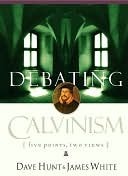More on this book
Kindle Notes & Highlights
When one side is constantly reduced to “it doesn’t say that,” instead of “the text positively asserts this,” the specter of tradition-trumping exegesis of the text is close at hand.
17 Even so faith, if it has no works, is dead, being by itself.
18 But someone may well say, “You have faith and I have works; show me your faith without the works, and I will show you my faith by my works.”
19 You believe that God is one. You do well; the demons also believe, and shudder.
20 But are you willing to recognize, you foolish fellow, that faith without works is useless?
“synergism,” the belief that God’s grace cannot save unless joined in the effort by the will of man.
“monergism,” the belief that His is fully able to save without the aid of His creatures.
Outside of the miracle of divine grace changing a God-hater into a God-lover, no man would ever be saved.
Those who promote the autonomous will of man and place the final choice of salvation in the hands of man must explain how such a person, enslaved to evil, an enemy of God, incapable of doing what is pleasing to Him, could in fact exercise saving faith and repentance, something that is obviously pleasing to God.
Those who are dead in sin can indeed understand the facts of the gospel message, but they will always respond in the same fashion: with rebellion, rejection, or suppression.
No person has the ability to come to Christ in faith unless God first effectively draws that person.
The idea that the fallen creature has the ability to control God’s free and sovereign work of salvation does not find its origin in the exegesis of inspired Scripture, but in the philosophies and traditions of man.
The Bible is plain: Fallen man is unable to come to Christ, unable to do what is good in God’s sight, unable to free himself from the shackles of sin. God must move in grace, not simply to make all men able to come, but to actually draw a people unto
Christ and save them.
The fact that conversion and salvation are of God, is an humbling truth. It is because of its humbling character that men do not like it. To be told that God must save me if I am saved, and that I am in his hand, as clay is in the hands of the potter, “I do not like it,” saith one. Well, I thought you would not; whoever dreamed you would?”
No more soul-destroying doctrine could well be devised than the doctrine that sinners can regenerate themselves, and repent and believe just when they please.… As it is a truth both of Scripture and of experience that the unrenewed man can do nothing of himself to secure his salvation, it is essential that he should be brought to a practical conviction of that truth. When thus convinced, and not before, he seeks help from the only source whence it can be obtained.
Unconditional election is simply the recognition of the biblical teaching that God is free in the matter of salvation.
His election is unconditional in that it is based solely on His purpose and His pleasure and not in anything whatsoever in the creature.
In biblical theology, it is God’s free will, not man’s, that determines the outcome of the work of salvation.
He chose a people, not a plan.
Upon what basis does God choose one and not another? “According to the kind intention of His will.” It is God’s will, God’s purpose, God’s intention that determines the issue.
I have peace with God because God in eternity past chose this undeserving sinner and placed His grace and love upon me.
God has appointed them to eternal life, and they believe.
It is God’s mercy, not man’s will or effort, that determines the outcome of salvation.
In the act of “mercying” as well as “hardening,” God, and God alone, is the determining agent.
The choosing of Judas was to apostleship and to the role of His betrayer. It was not unto salvation.
Embrace
synergism
and you are forced to divide the glory due to God alone between the Father, who tries so hard, the Son, who makes a theoretical salvation a mere possibility, the Spirit, who attempts to bring conviction to sinners, and the self-appointed redeemed, who demonstrate that in some way, shape, or form, they are “better” than ...
This highlight has been truncated due to consecutive passage length restrictions.
Calvinists like Spurgeon call upon all men everywhere to believe and repent, just as the Word of God does. We do not know who the elect are; hence, we preach the gospel to every creature.
faith and repentance are gifts given by God in regeneration,
The preached Word is God’s chosen means of bringing His elect unto Himself.
they could not do so (6:44).
the verb gives in verse 37 is in the present tense:
The “golden chain of redemption” begins in Romans 8:29 and comprises a chain of five verbs, all of which have God as the subject and the elect as their object. The verbs are:
The term translated foreknow is an active verb.
in none of these passages does God foreknow future events.
The direct object of “foreknow” when used of God is always personal.
God foreknows t...
This highlight has been truncated due to consecutive passage length restrictions.
His p...
This highlight has been truncated due to consecutive passage length restrictions.
C...
This highlight has been truncated due to consecutive passage length restrictions.


